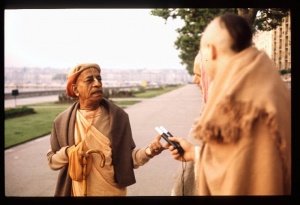SB 7.12.16: Difference between revisions
m (1 revision(s)) |
(Vanibot #0054 edit - transform synonyms into clickable links, which search similar occurrences) |
||
| (One intermediate revision by one other user not shown) | |||
| Line 1: | Line 1: | ||
{{info | {{info | ||
|speaker= | |speaker=Nārada Muni | ||
|listener=King | |listener=King Yudhiṣṭhira | ||
}} | }} | ||
[[Category:Srimad-Bhagavatam - Canto 07 Chapter 12]] | |||
[[Category:Bhagavatam Verses Spoken by Narada Muni - Vanisource|071216]] | |||
<div style="float:left">'''[[Srimad-Bhagavatam]] - [[SB 7|Seventh Canto]] - [[SB 7.12: The Perfect Society: Four Spiritual Classes|Chapter 12: The Perfect Society: Four Spiritual Classes]]'''</div> | |||
<div style="float:right">[[File:Go-previous.png|link=SB 7.12.15]] '''[[SB 7.12.15]] - [[SB 7.12.17]]''' [[File:Go-next.png|link=SB 7.12.17]]</div> | |||
{{RandomImage}} | |||
==== TEXT 16 ==== | ==== TEXT 16 ==== | ||
<div | <div class="verse"> | ||
evaṁ vidho brahmacārī | :evaṁ vidho brahmacārī | ||
vānaprastho yatir gṛhī | :vānaprastho yatir gṛhī | ||
caran vidita-vijñānaḥ | :caran vidita-vijñānaḥ | ||
paraṁ brahmādhigacchati | :paraṁ brahmādhigacchati | ||
</div> | </div> | ||
| Line 17: | Line 22: | ||
==== SYNONYMS ==== | ==== SYNONYMS ==== | ||
<div | <div class="synonyms"> | ||
evam | ''[//vanipedia.org/wiki/Special:VaniSearch?s=evam&tab=syno_o&ds=1 evam] [//vanipedia.org/wiki/Special:VaniSearch?s=vidhaḥ&tab=syno_o&ds=1 vidhaḥ]'' — in this way; ''[//vanipedia.org/wiki/Special:VaniSearch?s=brahmacārī&tab=syno_o&ds=1 brahmacārī]'' — whether one is a brahmacārī; ''[//vanipedia.org/wiki/Special:VaniSearch?s=vānaprasthaḥ&tab=syno_o&ds=1 vānaprasthaḥ]'' — or one is in the vānaprastha-āśrama; ''[//vanipedia.org/wiki/Special:VaniSearch?s=yatiḥ&tab=syno_o&ds=1 yatiḥ]'' — or in the sannyāsa-āśrama; ''[//vanipedia.org/wiki/Special:VaniSearch?s=gṛhī&tab=syno_o&ds=1 gṛhī]'' — or in the gṛhastha-āśrama; ''[//vanipedia.org/wiki/Special:VaniSearch?s=caran&tab=syno_o&ds=1 caran]'' — by practice of self-realization and understanding of the Absolute Truth; ''[//vanipedia.org/wiki/Special:VaniSearch?s=vidita&tab=syno_o&ds=1 vidita]-[//vanipedia.org/wiki/Special:VaniSearch?s=vijñānaḥ&tab=syno_o&ds=1 vijñānaḥ]'' — fully conversant with the science of the Absolute Truth; ''[//vanipedia.org/wiki/Special:VaniSearch?s=param&tab=syno_o&ds=1 param]'' — the Supreme; ''[//vanipedia.org/wiki/Special:VaniSearch?s=brahma&tab=syno_o&ds=1 brahma]'' — the Absolute Truth; ''[//vanipedia.org/wiki/Special:VaniSearch?s=adhigacchati&tab=syno_o&ds=1 adhigacchati]'' — one can understand. | ||
</div> | </div> | ||
| Line 24: | Line 29: | ||
==== TRANSLATION ==== | ==== TRANSLATION ==== | ||
<div | <div class="translation"> | ||
By practicing in this way, whether one be in the brahmacārī-āśrama, gṛhastha-āśrama, vānaprastha-āśrama or sannyāsa-āśrama, one must always realize the all-pervading presence of the Supreme Lord, for in this way it is possible to understand the Absolute Truth. | By practicing in this way, whether one be in the brahmacārī-āśrama, gṛhastha-āśrama, vānaprastha-āśrama or sannyāsa-āśrama, one must always realize the all-pervading presence of the Supreme Lord, for in this way it is possible to understand the Absolute Truth. | ||
</div> | </div> | ||
| Line 31: | Line 36: | ||
==== PURPORT ==== | ==== PURPORT ==== | ||
<div | <div class="purport"> | ||
This is the beginning of self-realization. One must first understand how Brahman is present everywhere and how He is acting. This education is called brahma jijñāsā and is the real concern of human life. Without such knowledge, one cannot claim to be a human being; rather, he remains in the animal kingdom. As it is said, sa eva go-kharaḥ: ([[SB 10.84.13]]) without such knowledge, one is no better than a cow or an ass. | This is the beginning of self-realization. One must first understand how Brahman is present everywhere and how He is acting. This education is called ''brahma jijñāsā'' and is the real concern of human life. Without such knowledge, one cannot claim to be a human being; rather, he remains in the animal kingdom. As it is said, ''sa eva go-kharaḥ'': ([[SB 10.84.13]]) without such knowledge, one is no better than a cow or an ass. | ||
</div> | </div> | ||
__NOTOC__ | |||
<div style="float:right; clear:both;">[[File:Go-previous.png|link=SB 7.12.15]] '''[[SB 7.12.15]] - [[SB 7.12.17]]''' [[File:Go-next.png|link=SB 7.12.17]]</div> | |||
__NOTOC__ | |||
__NOEDITSECTION__ | |||
Latest revision as of 22:52, 18 February 2024

A.C. Bhaktivedanta Swami Prabhupada
TEXT 16
- evaṁ vidho brahmacārī
- vānaprastho yatir gṛhī
- caran vidita-vijñānaḥ
- paraṁ brahmādhigacchati
SYNONYMS
evam vidhaḥ — in this way; brahmacārī — whether one is a brahmacārī; vānaprasthaḥ — or one is in the vānaprastha-āśrama; yatiḥ — or in the sannyāsa-āśrama; gṛhī — or in the gṛhastha-āśrama; caran — by practice of self-realization and understanding of the Absolute Truth; vidita-vijñānaḥ — fully conversant with the science of the Absolute Truth; param — the Supreme; brahma — the Absolute Truth; adhigacchati — one can understand.
TRANSLATION
By practicing in this way, whether one be in the brahmacārī-āśrama, gṛhastha-āśrama, vānaprastha-āśrama or sannyāsa-āśrama, one must always realize the all-pervading presence of the Supreme Lord, for in this way it is possible to understand the Absolute Truth.
PURPORT
This is the beginning of self-realization. One must first understand how Brahman is present everywhere and how He is acting. This education is called brahma jijñāsā and is the real concern of human life. Without such knowledge, one cannot claim to be a human being; rather, he remains in the animal kingdom. As it is said, sa eva go-kharaḥ: (SB 10.84.13) without such knowledge, one is no better than a cow or an ass.